|
|
|
Sort Order |
|
|
|
Items / Page
|
|
|
|
|
|
|
| Srl | Item |
| 1 |
ID:
106705
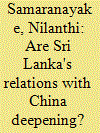

|
|
|
|
|
| Publication |
2011.
|
| Summary/Abstract |
During the past few years, Sri Lanka appears to have forged closer relations with China. Sri Lanka welcomed Chinese investment in building a port in Hambantota, arms from China for use in its civil war, and "dialogue partner" status in the Shanghai Cooperation Organization. Such high-profile moves have unnerved analysts fearing the rise of Chinese influence in the Indian Ocean region. A first-time, systematic analysis of the trends in Sri Lanka's economic, military, and diplomatic relations with China reveals that ties have indeed been strengthening. However, Sri Lanka is neither bandwagoning with nor balancing China, as structural realism predicts. More attention should be devoted to explaining the security thinking of small states that are not following such predictions in response to the emergence of a regional hegemon.
|
|
|
|
|
|
|
|
|
|
|
|
|
|
|
|
| 2 |
ID:
106009
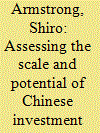

|
|
|
|
|
| Publication |
2011.
|
| Summary/Abstract |
The recent rise in Chinese outward direct investment (ODI) has significant global implications and impacts on host country policy. The present paper attempts to provide a theoretical basis and to define a robust econometric approach to assess the performance and potential of Chinese ODI. In this paper, foreign direct investment (FDI) performance is estimated using a frontier FDI model to measure how foreign investors, especially China, and the recipients of this direct investment perform relative to a benchmark of potential FDI. The results show that Chinese ODI achieves less of its potential compared with other investors. However, its ODI to Australia has performed much better than investment to other destinations. The results suggest that Chinese policy-makers should look at the pattern of China's ODI and, in light of superior performance in destinations like Australia, adjust policy strategies and institutional arrangements to enhance performance and reduce barriers to Chinese ODI.
|
|
|
|
|
|
|
|
|
|
|
|
|
|
|
|
| 3 |
ID:
103644
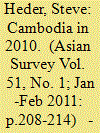

|
|
|
|
|
| Publication |
2011.
|
| Summary/Abstract |
Prime Minister Hun Sen's power became more concentrated. The economy expanded but was said to need diversification. Inequality intensified conflicts, but development generated legitimacy, while the political opposition and civil society were attacked. A U.N.-assisted court convicted five ex-Khmer Rouge leaders. Ties with China, the U.S., and Thailand improved.
|
|
|
|
|
|
|
|
|
|
|
|
|
|
|
|
| 4 |
ID:
115877
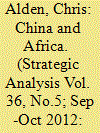

|
|
|
| 5 |
ID:
116347
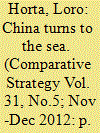

|
|
|
|
|
| Publication |
2012.
|
| Summary/Abstract |
As China's economy continues to expand, its policies and interests change and evolve. Today, Chinese economic and political interests span the globe from Africa to Latin America and the South Pacific. The country has grown more dependent on foreign energy sources in once marginal places such as Angola. Access to resources such as oil and natural gas are now at the forefront of Chinese security policy. While access to markets and regions where massive Chinese investment is occurring is equally important, these new challenges have led to some important changes in China's security and military posture, particularly its naval strategy. While diplomacy and economic power are still the most practical alternatives available to China to defend its interests, several Chinese military and civilian observers now openly discuss other alternatives, such as the eventuality of using military power to defend these interests. This is particularly visible in the People's Liberation Army Navy, where a more ambitious and confident maritime strategy is now being discussed.
|
|
|
|
|
|
|
|
|
|
|
|
|
|
|
|
| 6 |
ID:
129645
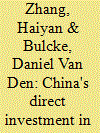

|
|
|
|
|
| Publication |
2014.
|
| Summary/Abstract |
While China is fast becoming an important outward direct investor, its companies are showing an increasing interest to locate in Europe and the European Union (EU). It has been suggested that this can partly be explained by the more lenient attitude of the European countries compared to the US, where some acquisitions were abandoned when they ran into political opposition based on security concerns. Yet, also in Europe, the media follow rather closely each new Chinese entry, and certain politicians have started to criticise the take-over of technology-oriented companies, especially by Chinese state-owned firms. Against the background of a very open foreign direct investment (FDI) policy as measured by OECD FDI Restrictiveness Index for the EU and the individual countries, an overview is given of the pre- and post-establishment obstacles to direct foreign investment. Also, the EU policy measures that directly or indirectly deal with incoming direct investment are discussed. Within the context of the EU competition policy and the merger regulation, the EU Commission has cleared five cases of take-over by Chinese state-owned enterprises. Although the Lisbon Treaty authorises the EU Commission to take charge of investment policy as part of the EU commercial policy, it will take time to realise this. If the announced negotiations about an investment treaty between China and the EU could work out the necessary balance, it would be an important step in achieving more reciprocity between their respective investment regimes.
|
|
|
|
|
|
|
|
|
|
|
|
|
|
|
|
| 7 |
ID:
129642
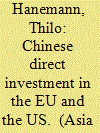

|
|
|
|
|
| Publication |
2014.
|
| Summary/Abstract |
Chinese outward foreign direct investment (OFDI) in developed economies has increased substantially in recent years, driven by policy liberalization and structural adjustments in China's economy. Efforts to accurately describe the dimensions of this increase are complicated by problems with official statistics and the complexity of deal structures. This article introduces the major problems of capturing data on global cross-border investment flows and elaborates on the particular difficulties of measuring Chinese outward FDI. It identifies alternative datasets that can help to better capture the scope and patterns of the Chinese overseas investment and uses one of them to describe the growth of Chinese investment in the EU and the US since 2000, highlighting similarities and differences in investment patterns in the world's two biggest economies.
|
|
|
|
|
|
|
|
|
|
|
|
|
|
|
|
| 8 |
ID:
129646
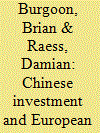

|
|
|
|
|
| Publication |
2014.
|
| Summary/Abstract |
The rapid increase in Chinese foreign direct investment (FDI) into Europe raises important questions about the implications of such for workers and organized labor in Europe: (1) does Chinese FDI flow more or less to regulated labor markets than do other investment sources?; (2) what are the strategies of works councilors and union representatives in dealing with real or expected investment from China?; and (3) how do individual workers view the propriety of Chinese FDI given China's low-wage, labor-unfriendly profile in the global economy? Quantitative and qualitative data on Chinese FDI, individual opinions about China and globalization, and on strategies of labor representatives provide some leverage to preliminarily answer these questions. First, Chinese FDI does not seem to be more (or less) focused on investing in the least regulated labor markets than other sources of FDI. Second, interviews with works councilors and union representatives in Germany, France and the Netherlands affirm a cautiously optimistic view of Chinese investors as no more or less threatening to organized labor than other investors. Third, analysis of attitudes about Chinese and European interests in managing globalization suggest that less-skilled, more vulnerable, pro-labor-union workers in Europe tend to be more rather than less enthusiastic about Chinese management than their fellow citizens. These patterns suggest a surprising, if tentative, embrace by workers and their representatives in Europe of that investment.
|
|
|
|
|
|
|
|
|
|
|
|
|
|
|
|
| 9 |
ID:
154229
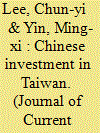

|
|
|
|
|
| Summary/Abstract |
Cross-Strait economic activities are no longer unidirectional. The Taiwanese government opened the doors to Chinese investment in 2009. This paper addresses the following crucial question: What is the impact of Chinese investment on Taiwan’s high-technology industrial development? Two further questions immediately follow: Will Chinese investment put Taiwanese industrial development at risk? Will an influx of Chinese investment lead to a turning point for Taiwanese industry? The paper first reviews Chinese investment in Taiwan under the framework of the Economic Cooperation Framework Agreement (ECFA) and then explains why we have chosen to focus here on the high-technology industry in Taiwan. It then outlines the main elements of Chinese outward foreign direct investment (OFDI) before seeking to answer the above research questions. Fieldwork for this paper was conducted from December 2014 to March 2016. Interviewees include Chinese investors, along with consultants from a Taiwanese institute created to promote industrial development.
|
|
|
|
|
|
|
|
|
|
|
|
|
|
|
|
| 10 |
ID:
129647
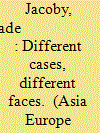

|
|
|
|
|
| Publication |
2014.
|
| Summary/Abstract |
Chinese investment in Central and Eastern Europe (CEE) is booming. As China's investment pattern has emerged so far, it appears to have little to do with Chinese firms' preferences for liberal policy regimes, tolerance for corruption, or reliance on communist-era networks. This article documents the current size and shape of Chinese firms' efforts to internationalize in this economic space, demonstrating an important difference between Chinese investment behavior in CEE and in the EU-15, namely the region's much more active use of greenfield activity (and lighter use of M&A and strategic alliances). Case studies of each mode (greenfield, M&A, and strategic alliances) reveal little evidence of a "China, Inc." approach and much evidence that Chinese firms are more motivated by market access than by technology or management assistance.
|
|
|
|
|
|
|
|
|
|
|
|
|
|
|
|
| 11 |
ID:
143167
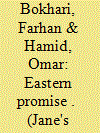

|
|
|
| 12 |
ID:
129644
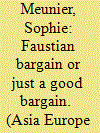

|
|
|
|
|
| Publication |
2014.
|
| Summary/Abstract |
This article explores the political challenges posed by the recent influx of Chinese outward foreign direct investment (OFDI) into the European Union (EU), which has become in 2011 the top destination for Chinese investment in the world. The central political question facing European states welcoming the influx of Chinese capital is whether this is a good bargain-a positive-sum game where both investor and investee benefit-or instead a Faustian bargain-a zero-sum game in the long term where capital is accompanied by implicit conditionality affecting European norms and policies, from human rights to labor laws. The novelty of Chinese FDI has the potential to affect politics in Europe in three different venues: inside European countries, between European countries, and between Europe and third countries. This article, whose main goal is to launch a research agenda on the political implications of Chinese FDI, explores in turn its potential impact on foreign and domestic policy, institutional process within the EU, and transatlantic relations
|
|
|
|
|
|
|
|
|
|
|
|
|
|
|
|
| 13 |
ID:
185614
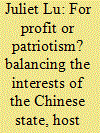

|
|
|
|
|
| Summary/Abstract |
Chinese state firms are expected not only to profit but also to serve state interests. But the Chinese state is fragmented: border provinces are taking on an expanded role in China's global expansion and a broad range of firm activities could be defined as patriotic contributions. Through the case of Yunnan State Farms (YSF), a province-level state-owned enterprise, this article explores how state firms interpret and navigate multiple state interests while also pursuing profit. The firm's ability to profit depends on balancing the demands and support of different Chinese state actors while depicting itself as a development partner to the Lao state and a contributor to Sino-Lao diplomatic relations and border region stability. This case thus shows that, instead of YSF's behaviour being directed by the state, the firm exercises considerable latitude in defining its contributions to state interests through the expansion of rubber production as a driver of development.
|
|
|
|
|
|
|
|
|
|
|
|
|
|
|
|
| 14 |
ID:
164766
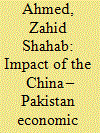

|
|
|
|
|
| Summary/Abstract |
Since the beginning of bilateral ties in 1950, the China–Pakistan relationship has grown significantly. Known as Pakistan’s ‘all-weather friend’, bilateral economic cooperation has been advanced by the China–Pakistan Economic Corridor (CPEC) agreement, worth US$62 billion of Chinese investment in Pakistan. Due to its geo-economic and geopolitical importance, the CPEC is considered a ‘game changer’ by Beijing and Islamabad. However, since its initiation in 2015, the CPEC has also been a source of tension between centre and provincial governments in Pakistan. This paper analyses the impact of the CPEC on nation-building in Pakistan. In the light of nation-building theories, it further argues that the CPEC has provided Pakistan with much-needed opportunities to address inter-provincial and federal–provincial discord through dialogue and compromises.
|
|
|
|
|
|
|
|
|
|
|
|
|
|
|
|
| 15 |
ID:
116096
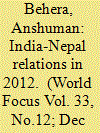

|
|
|
| 16 |
ID:
106011
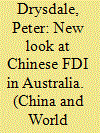

|
|
|
|
|
| Publication |
2011.
|
| Summary/Abstract |
Australia is China's largest destination for FDI, most of it directed to the resource sector. The scale and speed of the surge of Chinese investment into Australia, largely from state-owned enterprises (SOEs), has raised the question of whether investments by SOEs require special scrutiny. In China, the question is about the treatment of Chinese investment compared with investment from other countries. Clearly, Australia has had a policy environment that is very open to foreign investment, including investment from China. Nevertheless, it is questionable whether measures recently introduced in Australia to review investment by SOEs will restrict Chinese access to the Australian market or encourage a change in the nature of investment projects. How will Chinese enterprises need to adjust to the disciplines and rules in foreign markets? Will the Chinese Government need to take the regulations of host countries like Australia into account in its supervision of SOEs? Australia remains more open to Chinese investment than any other country in the world. Although the issue of SOE investment raises important new questions for policy-makers in Australia and other countries, Chinese investment in Australian resources is very beneficial and, with appropriate institutional and policy initiatives, will continue its strong growth.
|
|
|
|
|
|
|
|
|
|
|
|
|
|
|
|
| 17 |
ID:
159607
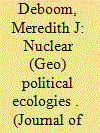

|
|
|
| 18 |
ID:
181906
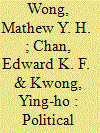

|
|
|
|
|
| Summary/Abstract |
This study examines the recent emergence of political consumerism in Hong Kong. Given its potential implications, we document the origin and maturation of this development and theoretically explain political consumerism from three perspectives: as a response to China’s economic intervention, as a form of identity politics, and as a new form of political participation. Drawing on original data collected from a representative survey of the local population, supplemented by interviews with stakeholders from the pro-democracy economic circle, we found that people who opposed China-Hong Kong economic integration and expressed a strong local (as opposed to national) identity tended to support boycotting. People who engaged in political consumerism were active in both legal and radical protests, pointing to the complementary nature of these different forms of activism. Further, by adopting a mediation analysis, we find that support towards the Anti-extradition Law Amendment Bill Movement only partially mediate the effect of the factors on political consumerism, suggesting that they are distinct development despite their shared origins. This article provides a novel perspective on the political polarisation in Hong Kong among consumer markets.
|
|
|
|
|
|
|
|
|
|
|
|
|
|
|
|
| 19 |
ID:
129640


|
|
|
|
|
| Publication |
2014.
|
| Summary/Abstract |
Though still a small percentage of the total stock of Foreign Direct Investment (FDI) present in European countries, FDI coming from China has risen dramatically in the European Union (EU) since 2009. This introduction to the special issue on "The Politics of Hosting Chinese Investment in Europe" examines the political fears aroused by this recent surge and by the prospect of continued Chinese direct investment in European economies. After surveying patterns of Chinese investment in the EU, this introduction asks what is distinctive about the potential economic and political consequences of Chinese FDI and lays out the argument for and against treating Chinese FDI as sui generis
|
|
|
|
|
|
|
|
|
|
|
|
|
|
|
|
| 20 |
ID:
188170
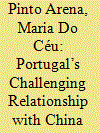

|
|
|
|
|
| Summary/Abstract |
Portugal has a longstanding relationship with China and has benefited from the economic opportunities arising from closer economic ties with Beijing, especially in the wake of the 2011 international bailout and external assistance programme. Lisbon wants to do as much business with China as possible. On the other hand, the United States (US) is Portugal’s most important ally. Thus, Lisbon has found itself caught between conflicting great-power interests. Amid rising US-China tensions, Lisbon has become a battlefield for both states’ geostrategic political ploys. Portugal needs to navigate complex partnerships as the European Union (EU) lacks a consistent foreign and security policy towards China. Lisbon needs to strike a balance between the unfailing commitment to the US and loyalty to the EU on the one hand, and the economic relationship with Beijing on the other.
|
|
|
|
|
|
|
|
|
|
|
|
|
|
|
|
|
|
|
|
|